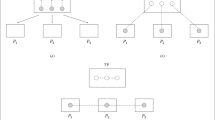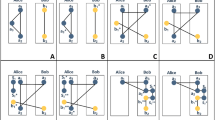Abstract
A novel three-party quantum key agreement protocol based on GHZ entangled states is proposed. In this scheme, each party transmits particle sequences through quantum channels. The transmitted particle sequences include two parts, one part is used for mutual authentication, and the other part is used for quantum key agreement. Firstly, the entanglement property of the three-particle GHZ state is used to realize the mutual authentication of the three parties. The remaining particle sequences combine the rule to perform Pauli operation. By measuring several sequences held by each party and combining the GHZ state truth table, the final result of the bitwise XOR of the private keys of the remaining parties can be obtained. In the end, three parties combine their own private key to obtain the final shared key. The final shared key cannot be determined by any subset of all the participants except the universal set and each party makes an equal contribution to the final key. In addition, security analysis and efficiency analysis show that our protocol can effectively resist common attacks and has feasible efficiency.




Similar content being viewed by others
Data Availability
The raw/processed data required to reproduce these findings cannot be shared at this time as the data also forms part of an ongoing study.
References
Qin, H.-W., Hao, X., Tang, W.K.S.: Quantum key distribution with single-particle and bell state[J]. Opt. Quant. Electron. 52(7) (2020)
Wang, J.-X., Liu, N., Wang, C., et al.: Multi-party quantum key distribution protocol without information leakage[J]. Int. J. Theor. Phys. 58, 2654–2663 (2019)
Ji Z.-X., Peiru F., Zhang H.-G.: Entanglement swapping for Bell states and Greenberger–Horne–Zeilinger states in qubit systems[J]. Phys. A: Stat. Mech. Appl. 585 (2022)
Ma, X.-Y., Wang, C., Li, Z.-X., et al.: Multi-party quantum key distribution protocol with new bell states encoding mode[J]. Int. J. Theor. Phys. 60, 1328–1338 (2021)
Gao, M., Wang, X.-M.: Quantum key distribution protocol based on four-particle W state[J]. Computer Applications and Software. 35(03), 294–298 (2018)
Yang C.-W., Tsai C.-W.: Efficient and secure dynamic quantum secret sharing protocol based on bell states[J]. Quantum Inf. Process, 19, 162 (2020)
Qin H.-W., Tang W.K.S., Tso R.: Three-party quantum secret sharing based on d-dimensional bell state[J]. Modern Physics Letters B. 33(3), 1950023 (2019)
Cheng X.-G., Guo R., Chen Y.-H., et al.: Improvement of a multi-layer quantum secret sharing based on GHZ state and bell measurement[J]. Int. J. Quantum Inf., 16(6), 1850053 (2018)
Wen-Wen H., Zhou R.-G., Li X., et al.: A novel dynamic quantum secret sharing in high-dimensional quantum system[J]. Quantum Inf. Process. 20, 159 (2021)
Yin, A., Chen, T.: Authenticated semi-quantum secret sharing based on GHZ-type states[J]. Int. J. Theor. Phys. 60, 265–273 (2021)
Zhou X.-T., Jiang Y.-H., Guo C-F., et al.: Quantum secure direct communication protocol based on GHZ state particles and single photon mixing [J]. J. Quantum Elect. (2021)
Song, Y., Bai, M.-Q., Qian, T., et al.: Controlled quantum secure direct communication protocol based on three-particle of GHZ-like state [J]. J. Quantum Elect. 38(01), 57–65 (2021)
Chang, K., Zheng, X.-Y.: Controlled quantum secure direct communication based on GHZ-like states[J]. J. Quantum Elect. 36(06), 714–718 (2019)
Zheng T., Chang Y., Zhang S.-B.: Arbitrated quantum signature scheme with quantum teleportation by using two three-qubit GHZ states[J]. Quantum Inf. Process. 19, 163 (2020)
Zheng X.-Y., Kuang C.: Arbitration quantum signature protocol based on XOR encryption[J]. Int. J. Quantum Inf. 18(05), 2050025 (2020)
Tao Z., Zhang S.-B., Yan C., et al.: Quantum blind signature scheme based on entanglement swapping of bell states[J]. Comput. Appl. Softw. 37(03), 310–313+333 (2020)
Yin, X.-R., Ma, W.-P.: Multiparty quantum key agreement based on three-photon entanglement with unidirectional qubit transmission[J]. Int. J. Theor. Phys. 58, 631–638 (2019)
Zhu, H.-F., Wang, C.-N., Li, Z.-X.: Semi-honest three-party mutual authentication quantum key agreement protocol based on GHZ-like state[J]. Int. J. Theor. Phys. 60, 293–303 (2021)
Yang, Y.-G., Li, B.-R., Li, D., et al.: New quantum key agreement protocols based on bell states[J]. Quantum Inf. Process. 18, 322 (2019)
Zhou, N.-R., Zhu, K.-N., Wang, Y.-Q.: Three-party semi-quantum key agreement protocol[J]. Int. J. Theor. Phys. 59, 663–676 (2020)
Shi, R.-H.: Useful equations about bell states and their applications to quantum secret sharing[J]. IEEE Commun. Lett. 24(2), 386–390 (2020)
Shi, R.-H., Liu, B., Zhang, M.-W.: Verifiable quantum key exchange with authentication[J]. Int. J. Theor. Phys. 60, 227–242 (2021)
Wang, C.-N., Li, Z.-X., Zhu, H.-F.: Flexible for multiple equations about GHZ states and a prototype case[J]. Int. J. Theor. Phys. 60, 3868–3884 (2021)
Zheng, X.-Y., Kuang, C., Liang, W.-Z.: Controlled quantum dialogue with authentication protocol on a basis of GHZ-like state[J]. Quantum Inf. Process. 19, 251 (2020)
Cabello.: Quantum key distribution in the Holevo limit[J]. Phys. Rev. Lett. 85(26 Pt 1), 5635–5638 (2000)
He, Y.-F., Ma, W.-P.: Quantum key agreement protocols with four-qubit cluster states[J]. Quantum Inf. Process. 14(9), 3483–3498 (2015)
Liu L.-J., Li Z.-H.: A verifiable quantum key agreement protocol based on six-qubit cluster states[J]. The European Phys. J. D, 75, 193 (2021)
Tang J., Shi L., Wei J.-H.: Controlled quantum key agreement based on maximally three-qubit entangled states[J]. Modern Physics Letters B, 34, 2050201 (2020)
Acknowledgements
This work was supported by the National Natural Science Foundation of China: Research on Precision PCR Instrument Model and Its Application in Genetic Engineering (Grant No. 62172330), and the Basic Scientific Research Project of Liaoning Provincial Department of Education (Grant No. LJC202007).
Author information
Authors and Affiliations
Corresponding author
Additional information
Publisher’s Note
Springer Nature remains neutral with regard to jurisdictional claims in published maps and institutional affiliations.
Rights and permissions
Springer Nature or its licensor holds exclusive rights to this article under a publishing agreement with the author(s) or other rightsholder(s); author self-archiving of the accepted manuscript version of this article is solely governed by the terms of such publishing agreement and applicable law.
About this article
Cite this article
Xu, Y., Wang, C., Cheng, K. et al. A Novel Three-Party Mutual Authentication Quantum Key Agreement Protocol with GHZ States. Int J Theor Phys 61, 245 (2022). https://doi.org/10.1007/s10773-022-05220-9
Received:
Accepted:
Published:
DOI: https://doi.org/10.1007/s10773-022-05220-9




